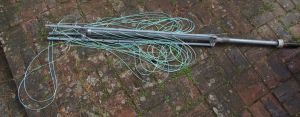A minor incident at the weekend started me thinking again about the question of why things happen.
I was writing an email to someone about a ship’s bell I’d seen in a museum store the day before. Realising that I needed some information that was in a book I had left on the garden table, I got up and went to the back door. A couple of steps lead down into the garden, and about 1½ metres from the steps there is a socket in the ground for a rotary close drier. This common and very useful gadget has multiple clotheslines strung between three long aluminium prongs, tipped with plastic caps. It was sunny here on Sunday morning, and we had put the drier up to take a wash that was churning around in the washing machine.
Hurrying to get the book, I didn’t notice one of that the aluminium prongs was facing me, until my headlong progress brought my eye into contact with its plastic cap. I must have instinctively shut my eye and slowed up the moment before hitting the prong. It was a real shock, and I was left feeling shaken, but the eye was undamaged and there wasn’t even a bruise. I was lucky. Do not try this at home.
But it set me thinking. Why did this particular event happen and why do things in general happen? There are various answers to the enigma that is the Clothesline Incident.
(a) The story set out above: saw bell + emailing a query about it + left book in garden + drier was up + my carelessness = ouch. The Role of Stupidity in History.
(b) Scenario (a) + good September weather = rotary clothesline erected = you get it. The Role of Weather in History.
(c) Scenarios (a) and (b) plus the invention of the first really successful rotary clothesline, apparently by an Australian named Lance Hill in the 1940s (1). The Role of Technology in History. No-one ever took their eye out by walking into a conventional clothesline strung between posts. Thanks a lot, Mr Hill.
(d) The foregoing scenarios + the reason I needed the book in the first place i.e. the ship’s bell (I’d like to do a bit of research into this and will publish it in a blog if it gets anywhere). The bell is of 16th-century date, apparently made in England for a Tudor warship. If the bell hadn’t existed, or if I hadn’t seen it, I wouldn’t have needed the information at that particular moment. The ship served in a navy that really got going under Henry VIII. At first the fleet was used chiefly as a means to invade France, but subsequently became a bulwark against the invasion of England. This was after Henry’s break with the Roman Catholic Church turned England into a heretic nation in the eyes of the great Catholic powers of Europe.
(e) So there you have it. Henry VIII bears fundamental responsibility for me nearly poking my eye out last Sunday.
Our lives are full of turning points, big and small. For a historian, one of the things you have to do in studying events is to try to decide what are minor causes of things, and what are major ones. For example, in the light of the 1914 anniversary there has been a lot of discussion about how the assassination of the Archduke Ferdinand and Duchess Sophie led to European war some weeks later. The assassins almost missed their chance, but for the bad luck of the Archduke’s car accidentally pulling up in front of Gavrilo Princip.
In one way, the deaths of these two people precipitated events that led to the deaths of millions. But did they, really? The nations of Europe were already armed to the teeth, international rivalry and rank fear were in the air, and some countries were already planning for war. Something else could have set the whole, terrible process in motion.
On a personal level, looking into Why Things Have Happened to Me As They Did can drive you a bit bonkers, if you’re not careful. For individuals and societies, this brings us into the territory of might-have-beens, sometimes called ‘counterfactual history’. It also leads on to ideas of alternate universes, brought into being every instant as timelines split in an inconceivably large number of directions. The idea of the ‘multiverse’ has gained some popularity in scientific and philosophical circles, and the well-known physicist Professor Brian Cox has recently expressed support for the notion (2).
I have not the slightest idea if the ‘multiverse’ really exists, and nor does the scientific community. The alternate universe theory has long been popular in science fiction, and it has been aired recently in the novels by Terry Pratchett and Stephen Baxter, The Long Earth and The Long War. It’s an appealing, if confusing idea, but until someone actually steps through an inter-dimensional doorway we’re not going to know if it’s the most astounding scientific insight ever or the modern equivalent of the imaginary monsters that peopled some 16th-century sea charts.
Of course, there is always the belief in Fate or Destiny. Perhaps I was fated to walk into the clothesline, though this seems a too-convenient way of repackaging past events in a way that suggests all our lives are governed by higher powers.
Why things happen is a fascinating question, and one we should continue to ask, whether it’s about history or the present day. As for the rotary clothesline, its fate is sealed. It will be going to the local tip. Probably. Unless something else happens – or doesn’t.

